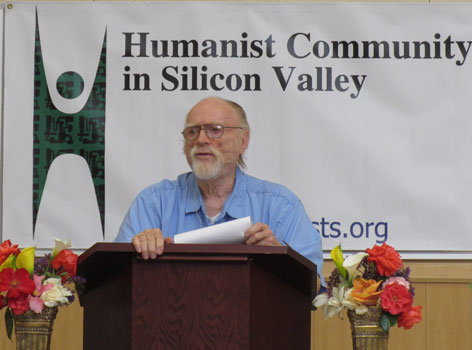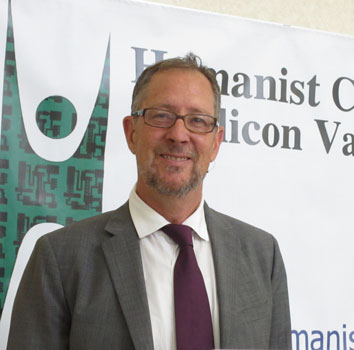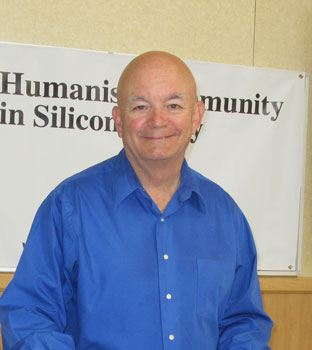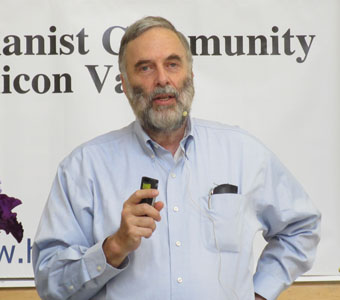Ken Abraham
May 27, 2012

Sappho was a renowned, feminist poet in Ancient Greece who was born on the island of Lesbos. Her poems were known and appreciated all over the ancient world. What was the source of her fame, and what happened to her work is the subject of this talk by Ken Abraham, a long-time member of the Humanist Community in Silicon Valley.
Ken’s talk included several beautiful poems as well as much more information including the following facts. Sappho was a wealthy woman and the first one of note to live in a society which used money. Her poetry, known as lyric because it was accompanied on a lyre, was collected in nine books. Cicero called her, “The greatest ever!” Her poetry was well known until 1073 when Pope Gregory VII demanded that it all be brought to Rome and burned in a great fire outside his residence. Fortunately, in 1920 the winds of Egypt uncovered a small, ancient town with a library which had one of Sappho’s poems that had been copied on to parchment.
Humanist Community Forum (2012-05-27): Sappho (Ken Abraham) from Humanist Community-SiliconValley on Vimeo.
Other prominent women authors include:
Murasaki Shikibu, (c. 973 – c. 1014 or 1025) was a Japanese novelist, poet and lady-in-waiting at the Imperial court during the Heian period. She is best known as the author of The Tale of Genji, written in Japanese between about 1000 and 1012.
Sidonie-Gabrielle Colette (28 January 1873 – 3 August 1954) is best known for her novel Gigi, upon which Lerner and Loewe based the stage and film musical comedies of the same title.
Doris May Lessing, (October 22, 1919-present) is a Zimbabwean-British novelist, poet, playwright, librettist, biographer and short story writer. Her novels include The Grass Is Singing, The Golden Notebook, The Good Terrorist, and five novels collectively known as Canopus in Argos.
Grace Paley (December 11, 1922 – August 22, 2007) was an American-Jewish short story writer, poet, and political activist.
Nadine Gordimer (November 20, 1923-present) is a South African writer, political activist and recipient of the 1991 Nobel Prize in Literature. Her writing has long dealt with moral and racial issues, particularly apartheid in South Africa.
Toni Morrison (February 18, 1931-present) is an American novelist, editor, and professor.
Men who have written women characters realistically include:
William Shakespeare (April 26, 1564 – April 23, 1616) was an English poet and playwright, widely regarded as the greatest writer in the English language and the world’s pre-eminent dramatist.
Henrik Ibsen (March 20, 1828 – May 23, 1906) was a major 19th-century Norwegian playwright, theatre director, and poet. He is well known for The Doll’s House and Hedda Gabbler.
Sir James Matthew Barrie, (May 9, 1860 – June 19, 1937) was a Scottish author and dramatist, best remembered today as the creator of Peter Pan and other plays including The Twelve Pound Look.
Thomas Lanier “Tennessee” Williams III (March 26, 1911 – February 25, 1983) was an American writer who worked principally as a playwright in the American theater.


 Derek Tennant has many stories to tell from his work with FEMA following recent large hurricanes. He has also performed volunteer work in Haiti and Thailand (for Burmese refugees). In addition to discussing his own experiences, he will facilitate a discussion about our own disaster preparedness and ways we can help each other become more resilient.
Derek Tennant has many stories to tell from his work with FEMA following recent large hurricanes. He has also performed volunteer work in Haiti and Thailand (for Burmese refugees). In addition to discussing his own experiences, he will facilitate a discussion about our own disaster preparedness and ways we can help each other become more resilient. All over the world, democratic reforms have brought power to the people, but under conditions where the people have little opportunity to think about the power that they exercise. Stanford Professor James S. Fishkin will discuss his book whose title is the title of this talk. In this book, he combines a new theory of democracy with actual practice and shows how an idea that harks back to ancient Athenians and their use of the Kleroterion machine can be used to revive our modern democracies. Professor Fishkin is a Professor of Communication and Professor of Political Science at Stanford. He is also Director of Stanford’s Center for Deliberative Democracy and Chair of the Dept. of Communication. For more information on this critical subject see his web site:
All over the world, democratic reforms have brought power to the people, but under conditions where the people have little opportunity to think about the power that they exercise. Stanford Professor James S. Fishkin will discuss his book whose title is the title of this talk. In this book, he combines a new theory of democracy with actual practice and shows how an idea that harks back to ancient Athenians and their use of the Kleroterion machine can be used to revive our modern democracies. Professor Fishkin is a Professor of Communication and Professor of Political Science at Stanford. He is also Director of Stanford’s Center for Deliberative Democracy and Chair of the Dept. of Communication. For more information on this critical subject see his web site: